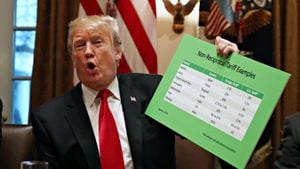The 2024 U.S. election is shaping up to be one of the most contentious and closely monitored events, with millions of Americans gearing up to cast their votes. This election sees familiar faces, Donald Trump, the Republican frontrunner, and Kamala Harris, the Democratic incumbents, facing off again. The stakes could not be higher, as tension mounts and voters prepare to decide the nation’s direction.
According to the latest reports from various sources, including Politico and AP News, voter turnout is expected to be significantly high, with both parties working tirelessly to engage potential voters. Early voting and absentee ballots are becoming increasingly popular, with many states allowing constituents to vote well before the actual election day. Reports indicate this trend may influence final results, particularly in swing states where each vote counts more than ever.
The Republican Party, capitalizing on discontent with the current administration, is galvanized under Trump’s leadership, who promises to restore what he frames as America’s former glory. His platform centers on strict immigration policies, economic reform, and endorsing the traditional Republican values of lower taxes, less regulation, and bolstering national security. Observers note how his returns to the campaign trail have seen substantial turnout at rallies, indicating fervent support among his base.
On the other side, Vice President Harris, running as the established figure during her first complete term, emphasizes progress, inclusivity, and the continuation of policies intended to aid working families and mitigate climate change. Harris's campaign has focused heavily on issues such as healthcare reform, gun control, and economic equality, aiming to energize young voters and those seeking change after the tumultuous Trump presidency.
Political analysts are keeping their eyes on various battleground states, particularly Wisconsin, Arizona, and Georgia, which played pivotal roles during the 2020 election. These states have been intensely contested, with both parties deploying resources to engage voters. The potential impact of demographic shifts and changing attitudes toward key issues could significantly sway the outcomes.
Debates are expected to stretch across multiple formats, including traditional town halls and social media engagements, where both candidates will need to defend their positions more than ever before. Analysts predict sharp exchanges as both sides gear up to remind constituents of contrasting visions for America’s future.
During the run-up to election day, partisan divides are becoming more pronounced. Stories circulating paint opposing pictures, with Trump framing Harris as part of the problem and Harris positioning Trump as the embodiment of division. Campaign news cycles are filled with attacks and counterattacks, adding to the drama surrounding this election.
Questions also loom over the integrity of the election process. Trump has raised concerns about voter fraud, echoing similar sentiments from 2020. His campaign emphasizes enhancing security and transparency around voting processes, promising supporters measures to uphold election integrity. But, Harris and her supporters argue these claims only serve to sow distrust among voters and undermine faith in the electoral system.
Polling data remains mixed. While Trump holds strong support among Republican voters, recent polls suggest Harris has gained traction among suburban voters previously disenchanted with her party's approach. The fluctuative dynamics of independent voters could prove decisive, as both campaigns alter strategies to appeal to this segment.
Voter enthusiasm is palpable, fueled by social movements and grassroots efforts pushing for broader representation and changes. Groups advocating for voter rights are mobilizing, focusing on removing barriers to voting access and combating aggressive gerrymandering practices seen across the nation.
One of the strategies Harris is employing focuses on economic messaging, particularly concerning the minimum wage and worker rights, presenting herself as the candidate for everyday Americans. Her policies aim to increase the minimum wage and support workers' rights to strike and unionize, rallying around the sentiment of equity.
On the flip side, Trump's messaging significantly emphasizes economic growth from tax reductions and job creation, claiming his approach benefits all Americans. His supporters often view former policies favorably, believing they protected jobs and encouraged business growth.
Political experts also highlight the effect of misinformation and social media battles as major elements shaping public perceptions leading up to the election. Both camps are actively involved, deploying digital strategies to counter false narratives and galvanize supporters.
Community engagement has become more integral to both campaigns, with local leaders playing significant roles. The importance of voter outreach through town halls, phone banks, door-knocking campaigns, and neighborhood engagement events cannot be overstated. Candidates know building genuine connections with voters is key to securing their support come election day.
Despite the looming uncertainty, anticipation builds as the country gears up for the culmination of this election season. Social media chatter buzzes with predictions, hopes, and fears, culminating as polls begin to take center stage. Each new piece of information could alter perceptions and solidify loyalties, leading to one of the most unpredictable elections yet.
Analysts also point out the role of the political media, who must navigate the hypercharged environment of today’s information ecosystem with responsibility and accuracy. The manner in which they cover candidates, elections, and issues will resonate deeply with the audience, dictaining narratives and influencing public opinion.
Overall, the upcoming election stands not only as a litmus test for issued policies but for the resilience of democracy itself. Voter turnout will speak volumes about the citizens’ engagement with governance — one of the founding principles of this nation. An energized electorate demanding accountability and representation could usher in significant changes, irrespective of party affiliation. All eyes remain firmly locked on November as the U.S. approaches this pivotal moment together, reflecting on what is at stake for each citizen.



